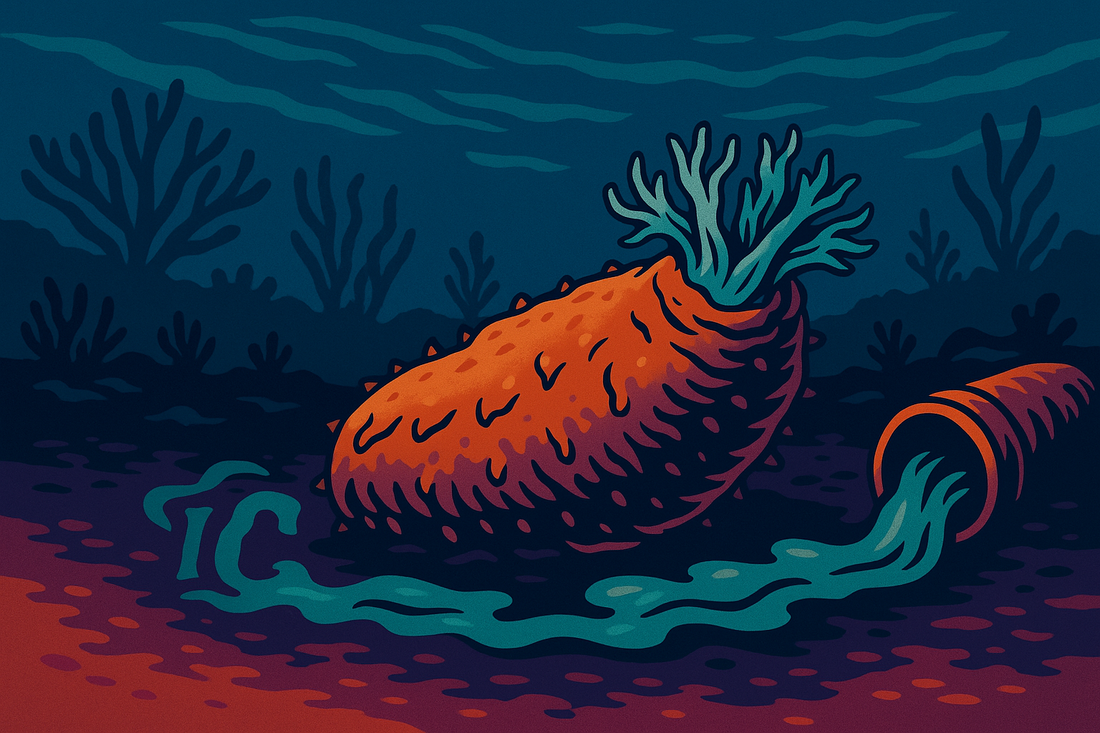
Sea Cucumbers: The Oceans Ridiculous Roomba
Ah yes, the sea cucumber, the ocean’s weirdest attempt at rebranding a soggy potato as an animal. Despite sounding like something you’d toss into a summer salad, sea cucumbers are not vegetables, not pickles, and definitely not the kind of thing you’d want near your vinaigrette. But somehow, here they are… crawling slowly across the sea floor, minding their own squishy business, and confusing generations with their misleading name.
So why are they called sea cucumbers?
It all started with the European explorers who stumbled across these gelatinous blobs and thought, “Huh… looks kinda like a cucumber. A sea cucumber!”
And just like that, a whole species got saddled with a name based solely on a singular vibe.
To be fair, when not ejecting their internal organs like some kind of underwater drama mama (more on that in a sec), sea cucumbers do sort of resemble a cucumber: oblong, textured, and vaguely greenish brown if you squint. But that’s where the resemblance ends.
They’re animals, not plants. Specifically, echinoderms, close relatives of starfish and sea urchins. But unlike their spiny cousins, sea cucumbers are basically muscular, inflatable tubes that slowly vacuum sand and poop out slightly cleaner sand. That’s right… they’re nature’s Roombas. Only slimier.
Now, let’s get weird.
When threatened, sea cucumbers don’t throw punches like the mantis shrimp or swim away like any other sane critter. No. They eject their intestines.
That’s right, they violently barf out their own guts, hoping the predator is grossed out enough to leave. And somehow, this works. Even better, they regrow those guts like it’s no big deal.
It’s the marine equivalent of throwing your wallet at a mugger and saying, “You know what? Keep it. I’ll grow a new one.”
Now here’s why you should care about these boogers of the deep.
Aside from being the drama kings and queens of the deep, sea cucumbers play a vital role in the health of marine ecosystems. By eating decaying matter and releasing clean sediment, they help keep ocean floors healthy and oxygenated. Some species even release larvae that help balance plankton populations.
Also, in some cultures, they’re considered a delicacy and traditional medicine—often dried and sold as “bêche-de-mer.” (Still not a cucumber.)
So no, sea cucumbers won’t go in your salad. They won’t freshen your breath. And unless you’re a very brave chef, they probably won’t land on your dinner plate either.
But they do deserve our respect, for their resilience, their eco contributions, and their bizarrely effective vomiting defense.
Adopt a Sea Cucumber (Spiritually, Not Literally)
Next time you’re scrolling aimlessly, take a second to learn more about ocean conservation.
Support marine life protection groups by shopping Immoral Coral where you can catch yourself some new merch with a porpoise. You can help reduce plastic use and end fast fashion. Join us and be determined to end detrimental endeavors to the deep sea and her inhabitants.
#SeaCucumberPride
#LongLiveTheSquish
#SaveTheSquishyPickles
